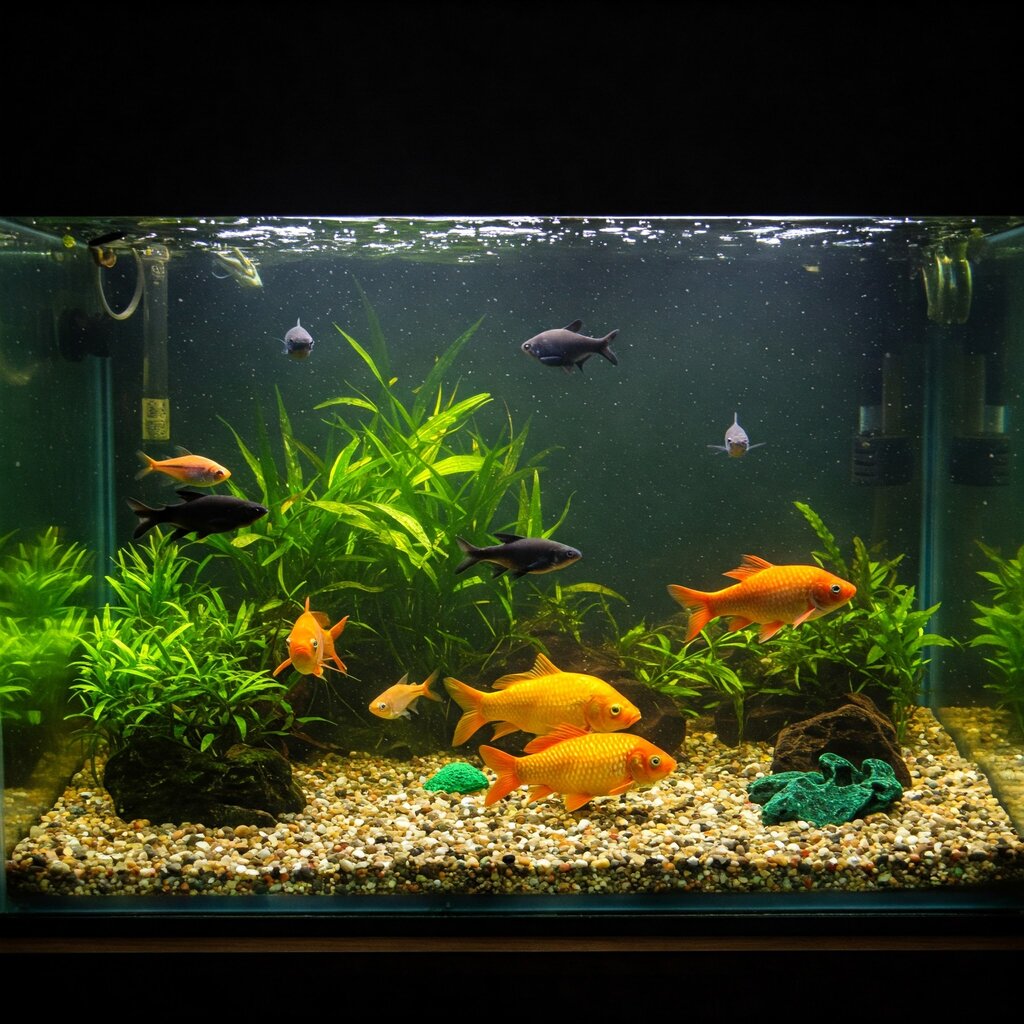Last Updated: 03/06/2025
Choosing the Right Filter for Your Aquarium
New fish tank? Not sure what to do? Read all the information about setting up your aquarium here.
Author: Dr Emilee Lay BVSc BSc (Vet) Hons
Reading Time: 11 minutes - short read
Filters are an essential part of fish keeping, but before buying one there are some things to consider. These trusty tools play a huge role in keeping your fish happy and healthy. Every fish tank should have a filter. Before buying a filter its important to understand what filtration is needed for your fish tank, and from there you can decide what type of filter will work best for your aquarium.
In this article
Types of filtratrion

There are 3 categories of filters:
- Biological filter: This is the most confusing of all of the types of filters as this actually refers to the bacterial population of the tank that helps to break down fish waste, so not actually a machine or a machine part!
- Mechanical filter: A filter that removes particles from the water. This is usually the mesh/sponge component within a tank filter.
- Chemical filter: Uses chemical reactions to help absorb harmful particles
Biological Filters
These bacterial filters help to break down ammonia formed from waste into nitrite and then into nitrate. They are an essential part of tank cycling (more on that later) and live on surfaced throughout the tank such as glass, ornaments, substrate, and your physical filter. Biological mediums which can be used to house these bacteria include plastic bio-balls or even the sponges used in mechanical filtration. Biological filters can be added to your tank as part of your routine maintenance.
Mechanical Filters
As the name suggests this physically removes waste particles and other contaminants inside your tank. This generally involves sponges or foams which are added to your aquarium filter. Acting as sieves these can trap even the smallest of particles. Remember that mechanical filters only TRAP waste but do not eliminate them. Routine cleaning of your filter is a must. However as you do not want to lose the beneficial bacteria that reside in the mechanical filters, ensure you use tank water to rinse and clean them. Certain Mechanical Filter sponges also have some additional chemical filtering effects as well.
Chemical Filters
This is a filter that uses chemical reactions to maintain water quality. A common example of this is activated charcoal, which binds up contaminants in the water, as well as water additives that bind and precipitate specific types of waste. The types of chemicals needed, really depends on your water parameters. Read more about this in Fish Tank Maintenance 101
Fish tank filters
Choosing a filter

The ideal filter combines all three of these and can help generate water flow and oxygen within your tank. It can be overwhelming picking a filter for your tank, especially with the huge variety on the market. The different types of physical filters you can buy include Hang on Filters, Internal Filters, Sponge Filters and Canister Filters. Filters also come in different sizes and strengths depending on the size of your tank. Always check the volume the filter is suited to prior to purchase.
Filter Maintenance

Your filter and filter media should be cleaned at least once a month for larger capacity filters this might be once a quarter. Remember when cleaning your filter and filter media to use your fish tank water or dechlorinated water to clean it - to preserve the beneficial bacteria in your media. If you need to replace your filter media, ensure you gradually replace it so that the new material can be seeded with beneficial bacteria that already exists in your tank.
Follow your manufacturing instructions as needed to disassemble and reassemble your filter. For filters that have specific cartridges or media inserts, be sure to keep an eye on them as they start to deteriorate so that you can gradually change them over. After cleaning your filter, be sure to add in beneficial bacteria to help support your tank system. Monitor water parameters carefully after a filter clean in case of a marked change to the cycle!
History
Our experts continually monitor the health and wellness space and we update our articles when new information becomes available.
Tue Feb 11 2025
Edited by Dr Teagan Lever BVSc (Hons)Dr Emilee Lay BVSc BSc (Vet) Hons
Veterinarian
Dr. Emilee graduated from the University of Sydney in 2018 with a Bachelor of Veterinary Science and Bachelor of Science (Veterinary Studies) and as a student worked for a number of years as a small animals and exotics nurse in clinics across Sydney. She is currently a practicing small animal and exotic vet along the Coast. Emilee holds a special passion for avian and exotic medicine (bunnies being her favourite patients), as well as animal behavioural medicine!

